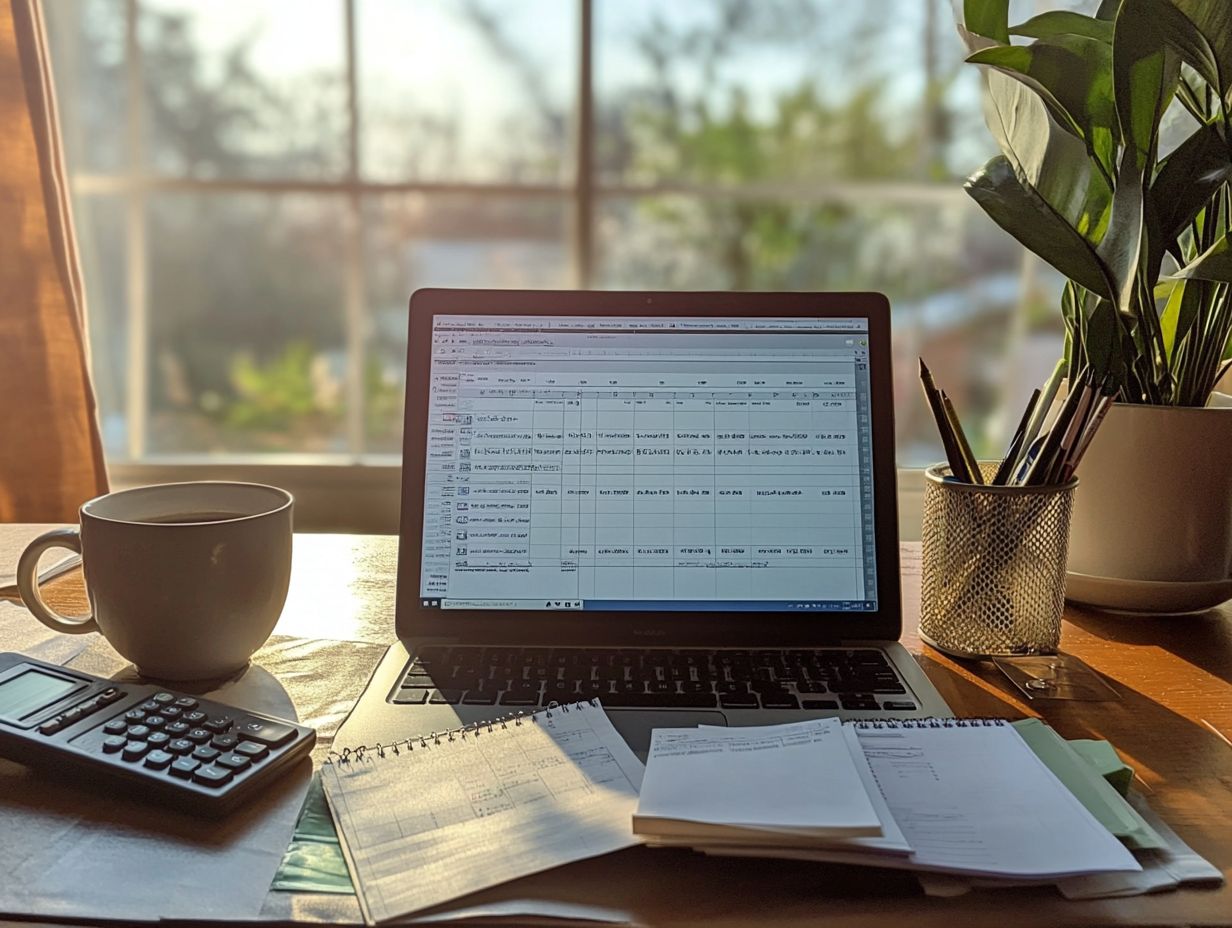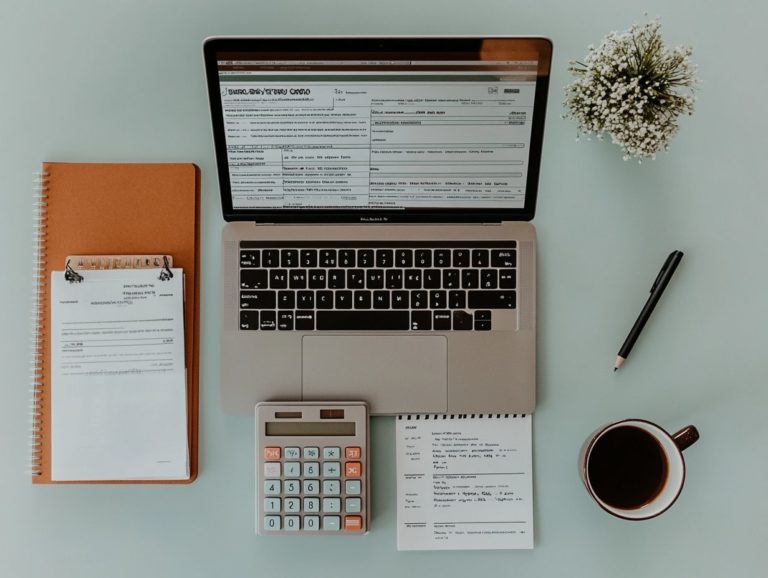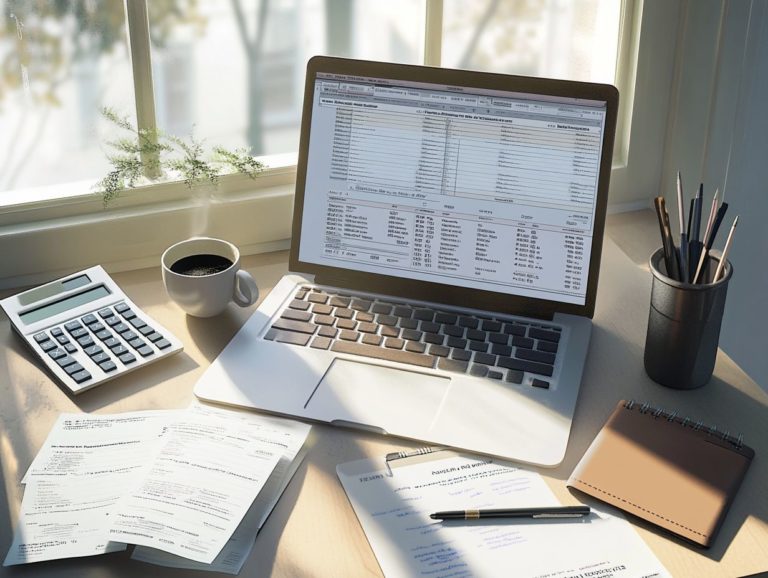How to Create a Tax Budget as a Freelancer
Freelancing offers you remarkable flexibility and independence, but it also introduces unique financial responsibilities, particularly when it comes to taxes. Understanding your tax obligations is essential to avoid any unwelcome surprises come tax season. Get ready to take control of your finances!
This guide equips you with the critical steps to create a tax budget specifically designed for freelancers. You ll discover the tools and strategies necessary for effective financial management, from meticulously tracking your income and expenses to maximizing deductions and maintaining organization.
It also highlights the benefits of collaborating with a professional accountant and preparing for key deadlines. Whether you re an experienced freelancer or just embarking on your journey, this guide is here to empower you to navigate your tax responsibilities with confidence.
Contents
- Key Takeaways:
- The Importance of a Tax Budget for Freelancers
- Steps to Creating a Tax Budget
- Maximizing Tax Deductions
- Tips for Staying Organized and on Track
- Working with a Professional Accountant
- Preparing for Tax Season
- Frequently Asked Questions
- 1. What is a tax budget and why is it important for freelancers?
- 2. How do I calculate my estimated taxes as a freelancer?
- 3. What are some common mistakes freelancers make when creating a tax budget?
- 4. How often should I review and update my tax budget?
- 5. Can I use accounting software to help me create and manage my tax budget?
- 6. What resources are available to help freelancers create a tax budget?
Key Takeaways:

- Properly understanding your tax obligations as a freelancer is crucial in creating an accurate tax budget.
- Tracking your income and expenses, as well as estimating and setting aside funds for taxes, are important steps in creating a tax budget as a freelancer.
- Maximizing tax deductions and staying organized are key in effectively managing your finances as a freelancer.
The Importance of a Tax Budget for Freelancers
Creating a tax budget is essential. With variable income and multiple revenue streams, navigating tax obligations can feel overwhelming. Neglecting this responsibility may lead to unexpected financial headaches.
By creating a well-structured tax budget, you can effectively monitor your financial strategies. This ensures you set aside sufficient funds for taxes for self-employed individuals while also preparing for retirement and any emergencies that may arise.
Understanding Tax Obligations
Understanding your tax obligations is essential as you navigate the complexities of taxes for self-employed individuals and comply with Internal Revenue Service (IRS) regulations.
You face a distinct set of challenges, from estimating quarterly payments to managing deductions and meticulously tracking your income. To navigate these complexities, consider maximizing deductions as part of a freelancer’s guide. With various tax liabilities at play—federal, state, and sometimes local—it’s crucial for you to stay informed about your financial responsibilities.
Seeking guidance from financial professionals can offer you tailored advice that directly addresses your unique situation. This can help ensure compliance and optimize your tax strategies. Engaging with a tax advisor, especially to learn how to handle tax audits as a freelancer, enables you to make informed decisions, potentially saving you money while avoiding costly penalties.
Steps to Creating a Tax Budget
Creating a tax budget is a systematic endeavor that requires you to follow several essential steps. This ultimately enables you to manage your finances with finesse as tax season approaches. Start by assessing your income sources and projecting any fluctuations you might encounter throughout the year.
Once you’ve established this foundation, shift your focus to meticulous expense management. Track both your personal and business expenses diligently. This approach not only simplifies your tax preparation but also helps you avoid the top tax mistakes freelancers make, setting you up for long-term financial success.
Tracking Income and Expenses
Tracking your income and expenses is crucial for gaining a clear understanding of your financial situation as a freelancer! By closely monitoring your financial movements, you can accurately assess your profitability and pinpoint areas that may need improvement.
Leveraging tools like expense tracking apps and spreadsheets can make this process a breeze. You can make quick entries and concise summaries that illuminate your financial standing. Additionally, considering freelancer tax strategies for increased savings can further enhance your financial management. Implementing effective budgeting strategies can enhance your cash flow management, allowing you to anticipate variations in income and expenses.
This ongoing vigilance helps you meet your short-term financial goals and lays the foundation for long-term stability, ultimately bolstering the viability of your freelance business and improving your cash flow management with tax planning tips for new freelancers.
Estimating Taxes and Setting Aside Funds

Estimating taxes accurately is essential for you as a freelancer to steer clear of financial pitfalls. This means setting aside the right amount of funds to meet your upcoming tax obligations.
Understanding the various methods available can make a substantial impact on how you manage your finances throughout the year. You can take advantage of tools like accounting software to track your earnings and expenses, establish an organized system for categorizing receipts, and consult resources that provide guidance on tax regulations. For freelancers, navigating quarterly taxes is particularly important for ensuring compliance and optimizing your financial strategy.
Adjusting your budget based on projected earnings helps you accommodate fluctuations in income, reducing stress when tax season rolls around. Regular financial check-ins provide valuable insights into your spending habits and promote proactive planning.
Creating an emergency fund dedicated solely to tax-related expenses is a savvy move. This smart strategy protects you from surprise expenses, ensuring your freelancing journey runs smoothly!
Maximizing Tax Deductions
Maximizing tax deductions is a savvy strategy you can embrace as a freelancer to effectively minimize your tax liabilities and elevate your overall financial management. Utilizing budgeting software can help streamline the process.
By understanding which expenses qualify, you can significantly reduce your taxable income. This allows you to keep more of your hard-earned money in your pocket.
Common Deductions for Freelancers
Common deductions for freelancers can greatly influence your overall tax burden, making it vital to understand the various expenses that you can write off, including investments in freelance tools.
You have a wealth of options at your disposal, from office supplies and software to home office expenses and professional development courses. For instance, costs associated with digital tools or subscriptions that enhance your work can often be deducted, resulting in significant savings.
Travel expenses, including mileage for business-related trips, also play a crucial role in alleviating financial pressures. It’s essential for you, as an independent worker, to consult with financial professionals who can offer tailored insights, ensuring you fully leverage the deductions available to you. Understanding the importance of keeping tax records for freelancers not only safeguards you against potential pitfalls but also maximizes your savings.
Tips for Staying Organized and on Track
Staying organized and on top of your finances is essential for freelancers like you to achieve your financial goals and maintain control over your freelance business. It enables you to navigate your financial landscape with confidence and precision, ensuring that every dollar is accounted for and directed toward your aspirations.
Tools and Strategies for Managing Finances
Utilizing the right money management tools can significantly streamline your finances as a freelancer, allowing you to concentrate fully on your client projects while employing effective budgeting strategies.
With a range of advanced budgeting software and expense tracking applications designed specifically for freelancers, you have numerous options at your fingertips to address your unique financial needs. These tools not only help you meticulously log your expenses but also assist in predicting your income and expenses, an essential component for maintaining financial stability. By offering insights into your spending habits and potential savings, they enable you to make well-informed decisions. For more targeted advice, consider exploring 5 budgeting techniques for freelancers that can enhance your financial management.
To truly elevate your financial management, it’s vital to complement these tools with personalized advice from financial advisors. Such guidance can tailor strategies to align with your specific business model, helping you optimize your finances and effectively plan for both your immediate and long-term goals. Additionally, if you’re a freelancer, consider incorporating essential tax tips for creative freelancers to navigate your financial landscape more effectively.
Working with a Professional Accountant

Working with a professional accountant can provide freelancers with valuable insights into tax planning and financial management. This support helps reduce the stress that often comes with handling finances.
An experienced accountant offers personalized guidance tailored to your needs. They will help you follow IRS rules while maximizing deductions and minimizing tax bills.
Benefits and Considerations
Teaming up with a professional accountant offers benefits beyond simple tax prep. You gain access to a wide range of financial management services, including retirement planning.
With their expertise, you can maximize deductions and take advantage of every available tax credit and write-off. This can significantly improve your financial health.
Accountants keep you compliant with changing tax laws, reducing the risk of costly penalties or audits. Continuous support is crucial for freelancers managing multiple clients and income streams.
When considering hiring an accountant, think about your financial complexity, potential tax savings, and the peace of mind expert guidance brings throughout the year.
Preparing for Tax Season
Tax season preparation is essential for freelancers. Staying organized and aware of key deadlines is crucial for meeting your tax obligations.
This not only ensures compliance but also secures your financial stability throughout the year.
Important Deadlines and Documents
As a freelancer, knowing key deadlines and required documents is essential for navigating tax season. Staying on top of important dates and gathering paperwork will make the process much smoother.
Be aware of the January 31st deadline for issuing 1099 forms to contractors and the April 15th due date for your income tax returns. Keeping organized records of income, expenses, and receipts will simplify preparation.
This proactive approach helps ensure timely filing and maximizes your deductions, especially when you know how to choose the right tax software as a freelancer, improving your overall financial management.
Frequently Asked Questions
1. What is a tax budget and why is it important for freelancers?

A tax budget is a financial plan that shows how much money you need to set aside for taxes. As a freelancer, you’re responsible for your own taxes, so having a tax budget helps you stay organized and avoid surprises during tax season.
2. How do I calculate my estimated taxes as a freelancer?
To estimate your taxes, figure out your total income for the year and subtract any deductions or credits. You can use tax calculators or consult a tax professional for accurate estimates.
3. What are some common mistakes freelancers make when creating a tax budget?
A common mistake is not including self-employment taxes, which are additional to income taxes. Freelancers also often overlook deductions and credits they might be eligible for. Stay informed and consult a tax professional if needed.
4. How often should I review and update my tax budget?
You should review and update your tax budget at least quarterly. This helps you stay on track and avoid surprises during tax season, making it less stressful.
5. Can I use accounting software to help me create and manage my tax budget?
Yes! Many accounting software options can help you craft and manage your tax budget. These tools can track your income and expenses, generate reports, and even assist with filing your taxes.
6. What resources are available to help freelancers create a tax budget?
There are several online calculators and budgeting templates tailored for freelancers. Don t hesitate to consult a tax expert for personalized advice on crafting a tax budget that suits you!






